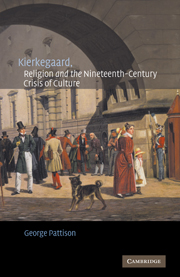Book contents
- Frontmatter
- Contents
- Preface
- Acknowledgements
- List of abbreviations
- 1 The sublime, the city and the present age
- 2 Kierkegaard and the world of the feuilletons
- 3 The present age: the age of the city
- 4 ‘Cosmopolitan faces’
- 5 Food for thought
- 6 A literary scandal
- 7 The reception of Either/Or
- 8 New Year's Day
- 9 Kierkegaard and the nineteenth century (1) Manet
- 10 Kierkegaard and the nineteenth century (2) Dostoevsky
- 11 Learning to read the signs of the times
- Bibliography
- Index
5 - Food for thought
Published online by Cambridge University Press: 22 September 2009
- Frontmatter
- Contents
- Preface
- Acknowledgements
- List of abbreviations
- 1 The sublime, the city and the present age
- 2 Kierkegaard and the world of the feuilletons
- 3 The present age: the age of the city
- 4 ‘Cosmopolitan faces’
- 5 Food for thought
- 6 A literary scandal
- 7 The reception of Either/Or
- 8 New Year's Day
- 9 Kierkegaard and the nineteenth century (1) Manet
- 10 Kierkegaard and the nineteenth century (2) Dostoevsky
- 11 Learning to read the signs of the times
- Bibliography
- Index
Summary
After From the Papers of One Still Living Kierkegaard's next published work was his magister's dissertation of 1841, On the Concept of Irony. Despite being advertised, along with Philipsen's other stock, in the pages of Figaro, the thesis would, as a piece of academic writing, seem to belong to a very different order of literature from anything we have been considering so far. In his account of Socrates, the dissertation's centrepiece, Kierkgaard certainly goes a long way towards playing the academic game, citing and debating the contrasting interpretations of such leading contemporary scholarly figures as Hegel, Schleiermacher, F. C. Baur and F. W. Ast. Yet the kind of concerns and intuitions, as well as the kind of stylistic and substantive juxtapositions of apparently heterogeneous material, that we have encountered as characteristic of Kierkegaard's feuilletonistic style show themselves in the thesis to a surprising degree. It was still unusual – Kierkegaard's was only the third case – for a thesis to be presented in Danish rather than Latin, and Kierkegaard was obliged to petition the King in order to get permission for this. Strikingly the principal reason offered by him is that the subject-matter of the thesis belongs pre-eminently to modernity, and despite much of the thesis being concerned with ancient philosophy this is ‘only insofar as the modern age has its beginning therein’ (SKS I, p. 131). Over and above this, however, Kierkegaard's style was sufficiently radical to cause concern bordering on consternation amongst his examiners.
- Type
- Chapter
- Information
- Publisher: Cambridge University PressPrint publication year: 2002



